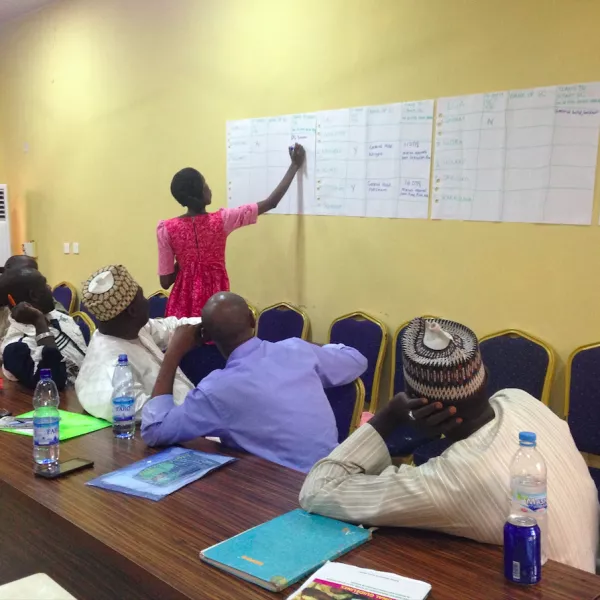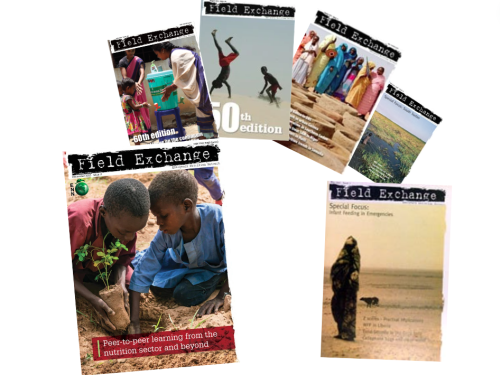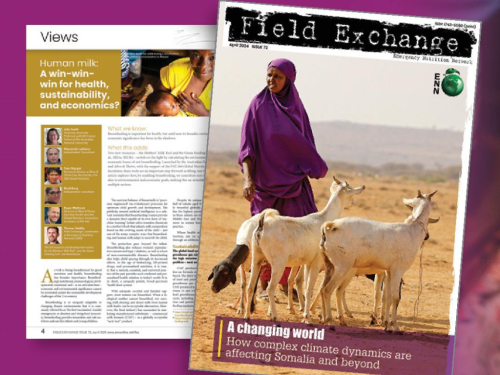Interested in writing for Field Exchange?
We welcome ideas for articles and submissions on nutrition policy, programming, and research from around the world, in both English and French.
We accommodate and value different styles of writing from people working at all levels.

Frequently asked questions on writing for Field Exchange
- Original articles - detailed accounts of programming experiences, policy changes, challenges faced and lessons learned or articles presenting the results of previously unpublished scientific research, operational research or evaluations (2,500 words)
- Views and letters – articles that share a particular individual or agency’s perspective on a relevant topic (1,000 - 2,500 words)
Field Exchange also includes short articles (500 words or less) that summarise previously published content:
- Research snapshots – summaries of published peer reviewed papers
- Report summaries – summaries of key reports published elsewhere
We publish a wide range of content on nutrition policy and programming. We are interested in nutrition-specific and nutrition-sensitive programming, plus institutional arrangements and coordination to support the treatment and prevention of all forms of malnutrition.
We have a particular focus on fragile contexts, either due to conflict or natural disasters, and countries with high burdens of undernutrition, many of which also have increasing burdens of overnutrition.
Please submit a paragraph (400 words maximum) outlining your proposed article by email to fex@ennonline.net . Include information such as:
- the nutrition problem
- a brief description of the programme or research that an article would cover
- a brief overview of the findings or results that would be shared, and key points that would be covered in a discussion, such as key achievements, challenges and lessons learned.
Bullet points are fine. You can also send us any supporting information that you have to hand to give us more information, such as a recent programme report or evaluation.
If your research has already been published and you would like us to consider including a summary in Field Exchange, please email us at fex@ennonline.net.
We welcome submissions in both English and in French.
Our experienced editorial team meets regularly to review submissions. We consider each individual piece against a series of set criteria, including originality, quality of the evidence shared and ability to provide interesting and relevant lessons learned for Field Exchange readers.
When we receive a lot of submissions, we also have to weigh up the value of potential articles against each other. We will confirm receipt of your submission and will aim to give you an answer within two weeks of receipt. In busy times, this may take a little longer.
If your submission is successful, we will inform you directly and may provide a suggested framework to develop your ideas around. We may also suggest having a phone call with you to find out more about your programme or research to inform this.
We will also share our writing guide that covers the details of Field Exchange’s writing style and agree a deadline for submission of your first draft.
Our experienced editorial team will provide all of the support that you need at each stage to develop your idea into a finished article. On submission of your first draft, we will provide a detailed technical review, providing suggestions for changes and requests for more information where needed. We will then return this to you to help guide your revisions. It usually takes several rounds of revision over several weeks to create a finished piece ready to publish. We will always make sure that you are happy with the final article before we share it.
We publish articles on the Field Exchange pages of our website as soon as they are ready. Most articles are also published in the upcoming issue of Field Exchange. If the upcoming issue has a special topic that does not fit the subject of your article, we will likely include it in the following issue. Field Exchange issues are published on our website in pdf form, and in print.
We publish three issues of Field Exchange each year.
Subscribing is free and is very easy. Subscribe now.




